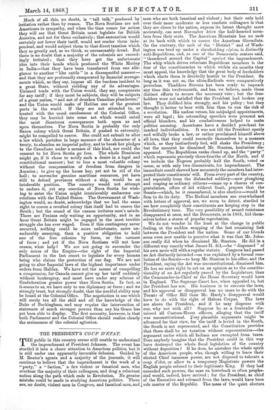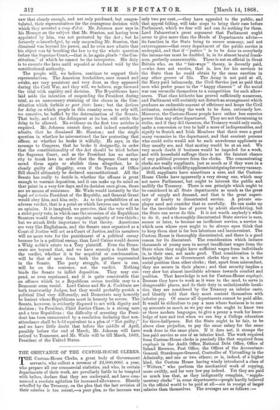THE PRESIDENT'S COUP D'ETAT.
THE public in this country seems still unable to understand the impeachment of President Johnson. The event has startled it into a closer attention to American politics, but it is still under one apparently incurable delusion. Guided by M. Beater's agents and a majority of the journals, it will continue to believe that the impeachment is the work of a "party," a "faction," a few violent or fanatical men, who overbear the majority of their colleagues, and drag a reluctant nation along the path which ends in Revolution. No greater mistake could be made in studying American politics. There are, no doubt, violent men in Congress, and fanatical men, and men who are both fanatical and violent ; but their only hold over their more moderate or less resolute colleagues is that they are closer to the nation, express its latent thought more accurately, can next November drive the half-hearted mem- bers from their seats. The American Mountain has no mob at its back with which to coerce the American Girondists. On the contrary, the mob of the " District " and of Wash- ington was bred up under a slaveholding re'ginte, is distinctly anti-Republican, and, as one of the Democratic orators said, "thundered around the Capitol" against the impeachment. The whip which drives reluctant Republican members is the fear of the constituencies to which within six months they must appeal, the knowledge that the great body of freeholders which elects them is decidedly hostile to the President. So long as it was not so, the ultra-Radicals were comparatively powerless. Thaddeus Stevens has been ready to impeach any time this twelvemonth, and has, we believe, made three distinct efforts to secure the necessary vote ; but the free- holders were not satisfied that the President had broken any law. They disliked him strongly, and his policy ; but they thought it better to bear with him than to run the risk of a revolution. His useless vetoes, his misjudged appointments, were all legal ; his astounding speeches were personal not official blunders, and his combativeness helped to make politics amusing. Americans have a decided penchant for marked individualities. It was not till the President openly and wilfully broke a law, or rather proclaimed himself above all laws, that they could reconcile themselves to a measure which, as they instinctively feel, will shake the Presidency; but the moment he dismissed Mr. Stanton, hesitation dis- appeared. The Republican ranks closed up, and the "party which represents precisely three-fourths of the North, and if we include the Negroes probably half the South, voted en masse, or with only two dissentients, for impeachment. The immediate result showed how accurately the members had inter- preted their constituents' will. From every part of the country, and especially from the disbanded soldiery—now ploughing and reaping as ordinary citizens—came up a chorus of con- gratulation, offers of aid without limit, prayers that the Senate—which, be it remembered, is also elective—would be firm to do its duty. The Radical members are overwhelmed with letters of approval, are, we seem to detect, startled to see how completely their constituents are keeping step to the Revolutionary tune. The very possibility of armed resistance disappeared at once, and the Democrats, as in 1861, hid them- selves before a storm of popular reprobation.
We do not wonder in the least at the change in public feeling, at the sudden snapping of the last remaining link between the President and the nation. Some of our friends seem even now unable to perceive what it was that Mr. John- son really did when he dismissed Mr. Stanton. He did in a different way exactly what James IL did,—he " dispensed " of his own mere will with a regular statute. Congress had passed an Act distinctly intended—as was explained by a formal reso- lution of the Senate—to keep Mr. Stanton in his office, and the President, saying the Act was unconstitutional, dismissed him. He has no more right to act on an opinion as to the constitu- tionality of an Act regularly passed by the Legislature, than the Commander-in-Chief or the Home Secretary would have in England. The Supreme Court has, when appealed to, but the President has not. His business is to execute the laws, and his approval or disapproval has no more to do with the Tenure of Office Bill than Mr. Hardy's disapproval would have to do with the right of Habeas Corpus. The laws are above the President, and if he may dispense with one, why not with all ? Suppose he as a freetrader dis- missed all Custom-House officers, alleging that the tariff was unconstitutional. Yery plausible arguments- might be advanced for that view, for the tariff is levied in the South, the South is not represented, and the Constitution provides that there shall be no taxation without representation—the argument under which all Indians are exempted from taxes. Does anybody imagine that the President could in this way have destroyed the whole fiscal legislation of the country without deposition ? If he does, he mistakes the whole spirit of the American people, who, though willing to leave their elected Chief immense power, are not disposed to tolerate a coup d'e'tat, or allow to a temporary Magistrate powers the English people refused to their legitimate King. If they had conceded such powers, the man on horseback so often prophe- sied would, indeed, have arrived ; for the President, as chief of the Executive and released from the laws, would have been sole master of the Republic. The mass of the quiet electors saw that clearly enough, and not only pardoned, but congra- tulated, their representatives for the courageous decision with which they arrested a coup d'etat. Mr. Johnson now says in his Message on the subject that Mr. Stanton, not having been appointed by him, was not protected by the Act ; but he formerly acknowledged, by only suspending Mr. Stanton, that dismissal was beyond his power, and he even now admits that his object was by breaking the law to try the whole question before the Supreme Court,—that is, he again pleads "the Con- stitution," of which he cannot be the interpreter. His duty is to execute the laws until repealed or declared void by the constitutional authority.
The people will, we believe, continue to support their representatives. The American freeholders, once roused and awake, are very persistent and very dour, as they appeared during the Civil War, and they will, we believe, urge forward the trial with rapidity and decision. The Republicans have laid aside the intention of suspending the President during trial, as an unnecessary straining of the clause in the Con- stitution which forbids ex post facto laws ; but the devices for delay on which people in this country seem to rely will, we conceive, be baffled by the determination of the Senate. That body, and not the delinquent at its bar, will settle the delay to be allowed. No evidence on the first two articles is required. Mr. Johnson cannot deny, and indeed constantly admits, that he dismissed Mr. Stanton ; and the single question is, whether he misconstrued the law protecting that officer, or whether he broke it wilfully. He says, in the message to Congress, that he broke it designedly, in order that the constitutionality of the Act should be tried before the Supreme Court, and as the President has no autho- rity to break laws in order that the Supreme Court may mend them again or abolish them altogether, he is clearly guilty of illegality, even if the Tenure of Office Bill should ultimately be declared unconstitutional. All the Senate has really to decide is, whether the offence is great enough to warrant deposition, and it can make up its mind on that point in a very few days, and its decision once given, there are no means of resistance. Mr. Wade would instantly be the legal ad interim President of the Republic, and General Grant would obey him, and him only. As to the probabilities of an adverse verdict, that is a point on which lawyers can best form an opinion. It is imagined, we perceive, that the vote will be a strict party vote, in which case the secession of six Republican Senators would destroy the requisite majority of two-thirds ; but we attach little importance to that theory. Americans are very like Englishmen, and the Senate once organized as a Court of Justice will act as a Court of Justice, and its members will no more vote for the punishment of a political enemy because he is a political enemy, than Lord Cairns would decree a Whig noble's estate to a Tory plaintiff. Even the Demo- crats are beyond that, and we have scarcely a doubt that the verdict, whether it is for acquittal or • condemnation, will be that of men from both the parties represented in the Senate. The party struggle, if there is one, will be on the sentence, not the verdict. Nothing binds the Senate to indict deposition. They may sus- pend, or even reprimand, and it is quite conceivable that an offence which to a Republican seems terrible may to a Democrat seem venial. Lord Cairns and Sir A. Cockburn are both trustworthy Judges, but they would probably punish a political libel very differently, and Democrats may honestly be lenient where Republicans must in honesty be severe. The Senate, however, is evidently disposed to act with dignity and decision ; its President, Chief Justice Chase, is a strong man and a true Republican ; the difficulty of arresting the Presi- dent has been surmounted by a resolution declaring that non- attendance shall be held equivalent to a plea of "Not guilty;" and we have little doubt that before the middle of April, possibly before the end of March, Mr. Johnson will have retired to Tennessee, and Mr. Wade will be till March, 1869, President of the United States.































 Previous page
Previous page